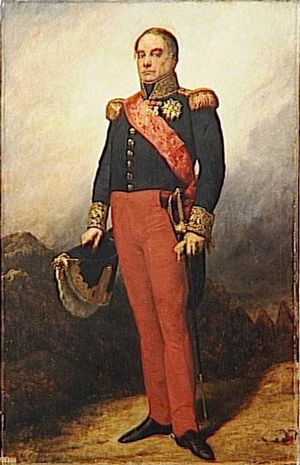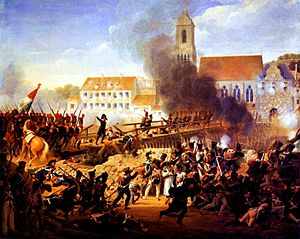Georges Mouton facts for kids

Georges Mouton, also known as the Count of Lobau, was a brave French soldier and an important political leader. He was born on February 21, 1770, and passed away on November 27, 1838. He achieved the very high rank of Marshal of France, which is like being a top general in the army.
Contents
Georges Mouton: A French Soldier and Leader
Early Life and Military Beginnings
Georges Mouton was born in a town called Phalsbourg in Lorraine, France. In 1792, when he was 22, he joined the French Revolutionary Army. This was a time of big changes in France. He fought in the early wars of the French Revolutionary Wars. By the year 1800, his bravery and skill helped him become a colonel, which is a high-ranking officer.
Rising Through the Ranks
Mouton continued to impress with his military talents. In 1805, after the French Empire was formed, he was promoted to général de brigade. This is a general who commands a brigade of soldiers. Just two years later, in 1807, he became a général de division, commanding an even larger group of troops.
Mouton showed great courage in several important battles. He fought bravely at the Battle of Jena, Landshut, and Aspern-Essling. Because of his important role in the Battle of Aspern, he was given the title of count of Lobau in 1810. This was a special honor from Emperor Napoleon I of France.
Serving Emperor Napoleon
During Napoleon's invasion of Russia, Georges Mouton served as a senior aide-de-camp to the Emperor. This meant he was a trusted assistant and advisor to Napoleon himself. He continued to serve with distinction in the 1813 military campaigns. He fought in major battles like the Battle of Lützen and the Battle of Bautzen.
After another general, Dominique Vandamme, was captured during the battle of Kulm, Mouton took command. He led the remaining soldiers of the corps in their retreat. Later, he served under Laurent Gouvion Saint-Cyr. After the battle of Leipzig, their forces were surrounded in Dresden. When they surrendered, Mouton became a prisoner of the Austrian Empire for the rest of the war.
The Hundred Days and Waterloo
When Napoleon returned to power for a short time, known as the Hundred Days, Mouton quickly rejoined him. He was made the commander of the VI Infantry Corps. He led these troops in the famous battles of Ligny and Waterloo. At the Battle of Waterloo, he was especially brave in defending the town of Plancenoit against the Prussian army.
Return to France and Political Career
After Napoleon's final defeat, Georges Mouton was forced to live in exile for a few years. He was allowed to return to France in 1818. His political career then began. From 1828 to 1830, he was elected to the House of Representatives. He was a member of the liberal political group.
In 1830, he played a key role in the July Revolution. This was a time when the French people rose up against the king. Mouton became the commander of the National Guard, a citizen militia.
Marshal of France and Later Years
As a reward for helping King Louis-Philippe come to power, Georges Mouton was made a Marshal in 1831. This was the highest military rank in France. He also became a Peer of France in 1833, which meant he was a member of the upper house of the French parliament.
In 1832 and 1834, Mouton was given the job of stopping uprisings in France. He was successful in putting down these rebellions.
Georges Mouton passed away in Paris in 1838. His death was caused by an old wound he had received during his many years of military service.
See also
 In Spanish: Georges Mouton para niños
In Spanish: Georges Mouton para niños
 | Charles R. Drew |
 | Benjamin Banneker |
 | Jane C. Wright |
 | Roger Arliner Young |


